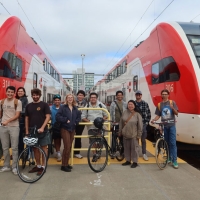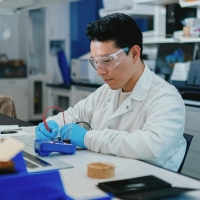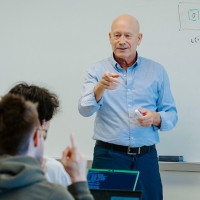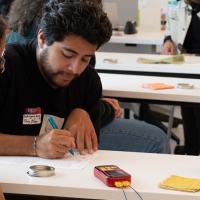Chinomnso Okorie
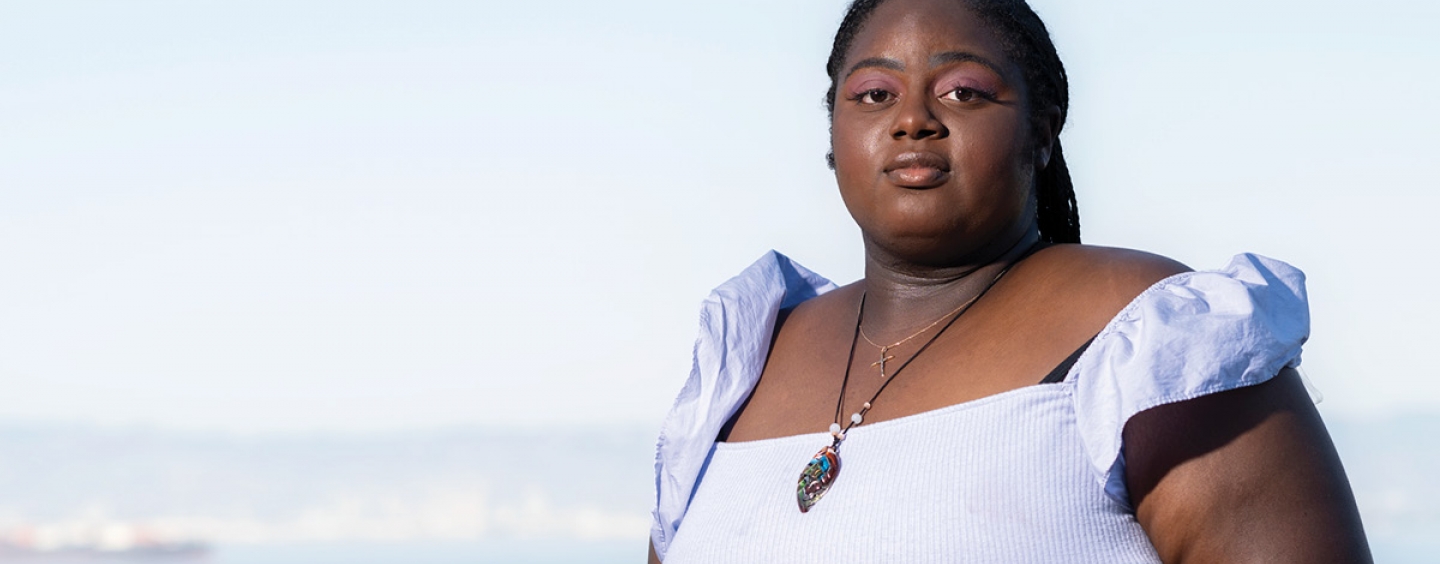
After growing up in a neighborhood with a troubling history of pollution, she’s using community-engaged research to fight health disparities
The 2019 film “The Last Black Man in San Francisco” opens with a young Black girl happily skipping up to a man in a hazmat suit picking up garbage in the Bayview neighborhood. The image is more than just striking, says biomedical scientist Chinomnso Okorie (B.S., ’17; M.S., ’19), who was raised in the Bayview. For her, it’s deeply meaningful.
Growing up, Okorie heard about the environmental pollution in her neighborhood but didn’t understand it. What was happening at the molecular level of Bayview residents? She came to SF State looking for answers.
And she found some. While working toward her master’s in Cell and Molecular Biology, she used community-engaged research to investigate the relationship between environmental exposure to lead and preterm birth. Just like the movie scene, her project highlights the very real social and health disparities experienced by Black communities in San Francisco.
As an SF State undergraduate, Okorie explored different facets of biology. She joined SF BUILD — a program enhancing diversity in the biomedical research workforce — to learn how to use data and science to study health disparities. She recalls watching friends in research labs, learning research skills by proxy.
But Okorie didn’t limit her search for answers to her major. She took classes in everything from human biology and medical sociology to Black literature and more.
“The point of taking all these classes was really to try to understand the Bayview and the mind of the African American community and the evolution of the African American community in the Bayview environment,” Okorie says.
Okorie’s scientific and social interests came together at the University’s Women’s Center, where she volunteered for three years. Experiences there helped her realize that she, as a Black woman, deserved a space in science. She brought science to the center, leading workshops about reproductive medicine and women’s health.
“I became so hyperaware of the fact that Black women suffered from the most disparities in terms of birth outcomes,” she says. “I slowly started to fall in love with reproductive health because nobody talks about these things. I was like, ‘Oh my gosh —
I found my niche!’”
As an SF State master’s student, her thesis project on stress and women’s health became an unexpected culmination of all of her different experiences. It was published in the International Journal of Environmental Research and Public Health.
Before government regulation of lead in the late 1980s, many cities like San Francisco used lead in gas, paint and water pipes. Some of these components are still present in low-income areas like Bayview-Hunters Point. The neighborhood is near a federal Superfund site, with unknown toxicity levels, and is also low-income, underrepresented and experiences more preterm births. African American/Black mothers are nearly three times more likely to have premature infants compared with white mothers, according to the San Francisco Department of Public Health.
Okorie knew that to effectively study these problems, she’d have to account for — and challenge — health disparities and inequities.
Okorie collaborated with 72 randomly selected hair salons and barbershops across 19 racially diverse San Francisco zip codes. These are safe spaces for many communities, she explains. Hair was a good conduit because it’s a less invasive source and stores metals like lead. However, hair is deeply personal and meaningful for many people, so transparency was important.
“We were trying to create a safe space where we talked about what was going on in our community,” she says. “The dialogue before we even got to collecting the samples [is critical]. The data we produced represented the community. We were doing the science on behalf of the community not just for scientific benefit.”
Of the 109 hair samples collected, Okorie found lead in every one, with the highest exposure in southeast San Francisco, a region that includes Bayview. These same regions have large African American/Black populations and high preterm birth rates.
Okorie is now a data scientist at the University of California San Francisco. But the work she started at SF State is not done. She continues to explore the effects of environmental exposure in the placenta during pregnancy and examine genetic-level changes. Outside of the lab, Okorie is involved in several community projects. One of her favorites is the Pop-up Village in Bayview, which provides services related to family, pregnancy and women’s health. Another is serving the Bayview community through Umoja Health, providing free COVID-19 testing and vaccinations.
Her research, her career trajectory, her Bayview community, even the chance timing of “The Last Black Man in San Francisco,” which was released as she was wrapping up her master’s — they are all connected, Okorie says.
“Over the years, we’ve gotten better at standing up for what is right and wrong here in the Bayview,” she says. “Our voices are starting to be heard, and the community is not relenting.”
